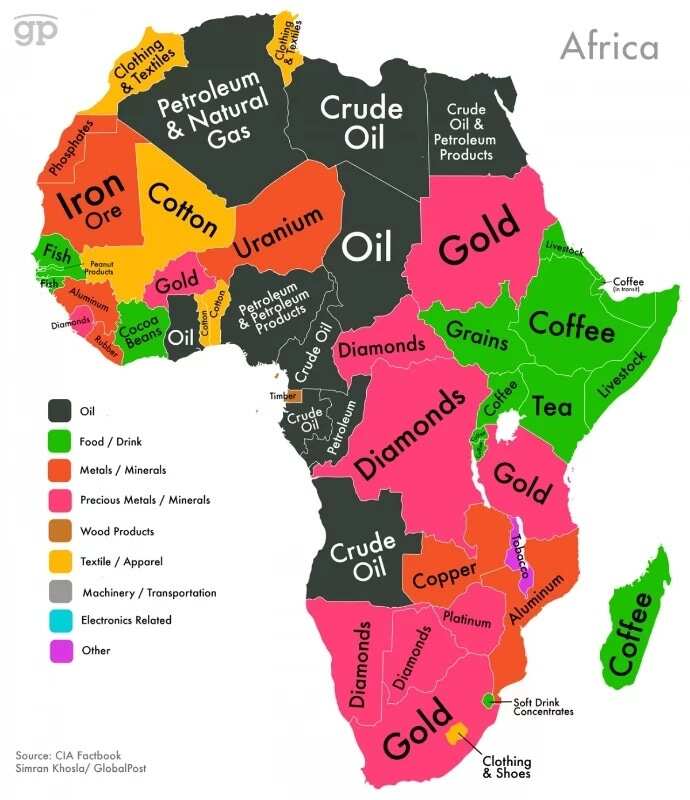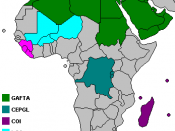At a recent regional economic forum, I witnessed the vibrant energy of African delegates eager to explore opportunities for enhanced trade collaboration. As a keen observer, I couldn’t help but envision the transformative potential of robust trade blocs across the continent, paving the way for increased economic prosperity, social development, and regional integration.

Image: www.legit.ng
Trade Bloc Evolution: A Historical Perspective
Trade blocs have emerged as a strategic tool for fostering economic cooperation and integration among nations. The idea took root in Africa decades ago, with notable regional organizations such as the Southern African Development Community (SADC), the Economic Community of West African States (ECOWAS), and the Common Market for Eastern and Southern Africa (COMESA) playing a pivotal role in shaping the continent’s trading landscape.
These regional trade agreements aim to facilitate seamless movement of goods and services, enhance investment opportunities, and promote economic convergence. By breaking down trade barriers, fostering economies of scale, and creating a level playing field for businesses, trade blocs have unleashed a myriad of benefits for member countries.
Benefits of Trade Blocs in Africa: A Comprehensive Overview
The advantages of trade blocs in Africa are multifaceted and far-reaching. Firstly, they promote regional economic integration, creating a larger market for goods and services, which in turn attracts investment and fosters economic growth.
Secondly, trade blocs enhance trade efficiency by reducing or eliminating tariffs and other trade barriers, making cross-border trade more affordable and accessible. This facilitates the movement of goods and services, benefiting consumers, businesses, and economies alike.
Increased trade within a bloc leads to economies of scale, allowing member countries to produce goods and services more efficiently and at lower costs. This cost advantage enhances competitiveness, boosts innovation, and attracts foreign direct investment.
Furthermore, trade blocs foster regional cooperation and integration. By working together, member countries can tackle common challenges, such as infrastructure development, energy security, and food security, that require a coordinated approach.
Lastly, trade blocs promote political stability and security in the region. Economic cooperation and mutual interdependence create incentives for maintaining peaceful relations and resolving disputes amicably.
Current Trends and Future Prospects of Trade Blocs in Africa
The trade bloc landscape in Africa is constantly evolving, with new initiatives and expansions emerging. The African Continental Free Trade Area (AfCFTA), launched in 2018, is a landmark agreement that aims to create a single market for goods and services across the entire continent. This ambitious project, if fully implemented, has the potential to transform Africa’s economic trajectory.
Other notable developments include the West African Monetary Zone (WAMZ), which aims to establish a common currency for member countries in the region, and the East African Community (EAC), which is pursuing a single customs territory and common market.
The future of trade blocs in Africa looks promising. With the right policies and implementation strategies, they can serve as powerful engines for economic growth, regional integration, and sustainable development. However, challenges such as infrastructure gaps, non-tariff barriers, and limited productive capacity need to be addressed to maximize their potential.

Image: www.writework.com
Expert Advice for Maximizing Trade Bloc Benefits
Based on my observations and interactions with experts in the field, here are some tips to maximize the benefits of trade blocs for African countries:
- Strong and Effective Dispute Resolution Mechanisms: Establish clear and efficient mechanisms for resolving trade disputes, promoting fair competition and protecting the interests of all members.
- Harmonization of Trade Regulations: To facilitate seamless trade, member countries should strive to harmonize trade regulations, standards, and customs procedures to reduce delays and costs.
- Capacity Building and Infrastructure Development: Invest in capacity building initiatives and infrastructure development to address supply side constraints and improve the competitiveness of businesses.
- Strategic Investment Attraction: Trade blocs can collectively promote the region as an attractive investment destination, leveraging their combined market size and growth potential.
- Public-Private Partnerships: Encourage strategic partnerships between governments and the private sector to drive innovation, infrastructure development, and job creation.
By adhering to these principles and fostering a conducive environment for trade and investment, African countries can unlock the full potential of trade blocs and reap the benefits they offer for economic prosperity, social development, and regional integration.
FAQ on Trade Blocs in Africa
Q: What is the main purpose of a trade bloc?
A: A trade bloc is a group of countries that have agreed to reduce or eliminate trade barriers and promote economic integration among themselves.
Q: What are some examples of successful trade blocs in Africa?
A: Examples include the Southern African Development Community (SADC), the Economic Community of West African States (ECOWAS), and the Common Market for Eastern and Southern Africa (COMESA).
Q: What are the benefits of trade blocs for African countries?
A: Benefits include increased trade efficiency, economies of scale, regional economic integration, and political stability.
Q: What is the future of trade blocs in Africa?
A: The future looks promising, with initiatives such as the African Continental Free Trade Area (AfCFTA) aiming to create a single market for goods and services across the entire continent.
Q: How can African countries maximize the benefits of trade blocs?
A: By adopting strong dispute resolution mechanisms, harmonizing trade regulations, promoting infrastructure development, attracting strategic investment, and fostering public-private partnerships.
Trade Blocs In Africa
Conclusion
Trade blocs serve as powerful instruments for fostering economic growth, regional integration, and sustainable development in Africa. Through enhanced trade, increased efficiency, and economies of scale, they offer numerous advantages to member countries. By implementing effective policies, addressing challenges, and leveraging expert advice, African nations can maximize the potential of trade blocs and unlock a brighter economic future for the continent.
Are you interested in learning more about trade blocs and their role in Africa’s development? If so, I encourage you to explore the resources provided in this article and join the conversation on social media. Share your thoughts and insights to contribute to the ongoing dialogue on this important topic.






